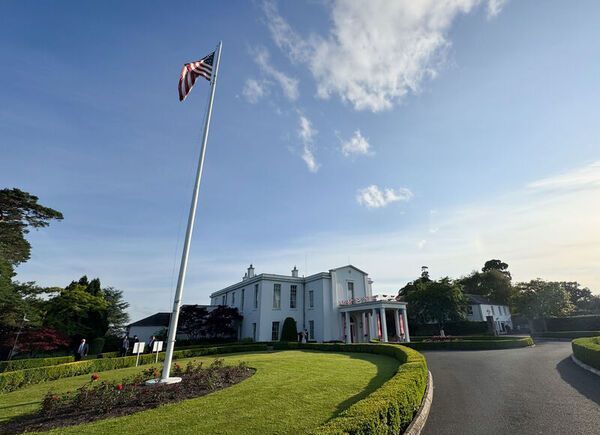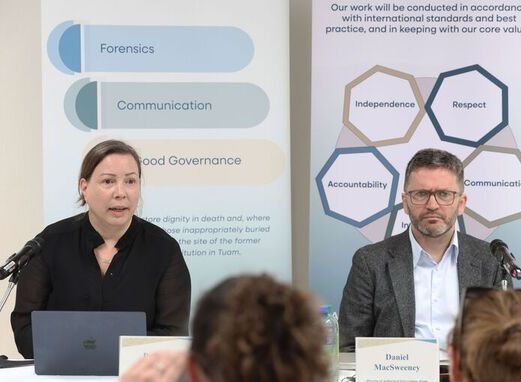James Doherty.
Page Turner / Edited by Peter McDermott
“The Liberal government of H.H. Asquith, comprised of talented and even brilliant politicians, credited with laying the foundations of the welfare state and with curbing the power of the House of Lords, got things spectacularly wrong on Ireland.”
So James Doherty begins his “Irish Liberty, British Democracy: The third Home Rule crisis, 1909-14.”
Doherty told the Echo, “It’s about the crisis resulting from an attempt to give Ireland a parliament of its own a little over a century ago, before the 1916 Easter Rising. It reappraises the place in history of the Irish nationalist leader, John Redmond, and recounts the forcefulness with which he stood up to ostensible friends and foes in Britain. It also shows how close Redmond’s project of an autonomous, united Ireland may have come to fruition.”
The idea of the inevitability of partition, Doherty writes, served the “Ulster Unionist mythologizing of the events of 1912-14” and “distracted attention from the degree of culpability of Sinn Fein leaders for Ireland’s sundered state.”
The debate about what happened to the party of Asquith has been an obsession for generations of historians, beginning in the 1930s with George Dangerfield’s “The Strange Death of Liberal England,” and continuing through to the revisionists of the 1970s -- who insisted the party was in “rude health” on the eve of the First World War -- and beyond to our own day. But, argues Doherty, almost all accounts ignore the centrality of the most important crisis facing the Liberals, one which was the source of considerable disillusionment for both the rank and file and progressive opinion-makers.
It omits, too, the hold Redmond had over the party’s radical wing in the country and most of the Liberal MPs at Westminster, which stopped the Cabinet from capitulating completely to the Tories and Unionist leaders like Edward Carson. Yet Doherty’s book is “no paean to Redmondism” – if the leader played his hand well in London, his leadership of the Irish Party “neglected many important matters in its single-minded quest for Home Rule.”
Doherty, a second-generation Irish-American who is “still in touch with relatives in Ballinamore, Co. Leitrim, whom I visit from time to time,” argues constitutionalists made other strategic errors as events unfolded. But they already faced an increasingly difficult situation at home in the decades following Parnell’s death.
He writes: “A headstrong, chauvinistic Gaelicism, hostile to Anglo-Irish culture, pointed to a nationalism inseparable from Roman Catholicism, and one that placed self-righteous cultural and religious purity above inclusivity.”
“Irish Liberty, British Democracy” has won praise from fellow historians. Frank Callanan, one of the leading authorities on pre-First World War constitutional nationalism, has written that its thesis “is well argued and movingly evoked in its conclusions.”
Doherty told the Echo: “I guess you could say I’m a late-flowering historian, having been a senior manager in business for 25 years in London, New York and Chicago.”
He added: “I’ve always had a keen interest in history, so when the opportunity to pursue historical research presented itself, I leapt at the chance. I was incredibly fortunate in selecting a subject that just seemed keep on giving.”

James Doherty
Date of birth: Oct. 1, 1962
Place of birth: Providence, R.I.
Residence: London
Published works: “Irish Liberty, British Democracy: the third Irish Home Rule Crisis, 1909-14”
What is your writing routine? Are there ideal conditions?
I have a small office at home, to which I confine myself from 9 a.m. to 7 p.m. I take an hour for lunch and break things up with a walk or a swim at the public pool most days. There’s some subconscious cogitation that goes on when I exercise, because it usually gets me back to my desk fired up with an idea or two.
What advice do you have for aspiring writers?
I think the preliminary work is essential. Start with an outline and decide on some chapter titles. These will change, of course, but it gets you to think about structure. Plus, when you break it down like this, it’s a lot less daunting to think, “I’ve got 12 pages to write” than it is to imagine writing 200. And take lots of showers. I get my best ideas in the shower. Must be the ozone in the air.
Name three books that are memorable in terms of your reading pleasure.
I remember being absolutely captivated by C.S. Lewis’s “The Lion, the Witch and the Wardrobe” as a child. I don’t think I’d ever read a book that was so enthralling, and so completely transported me to an imaginary world. That really started me on reading for pleasure.
Many years ago, I bought a collection of P.G. Wodehouse stories before a transatlantic flight. I laughed so much the cabin crew must have thought I was on something. The thing about Wodehouse is not just the humor, which has never been surpassed, but the sublime elegance of the writing. He really was a genius of the English language.
Not surprisingly, I also read history for pleasure. I recently re-read A.J.P. Taylor’s “The Struggle for Mastery in Europe.” It is as good as I remembered. Taylor’s history is old-fashioned: top-down and rather speculative by modern standards. But he never neglected to put the story in history, and the book is both engrossing and moving, just like the best works of literature.
Name a book that you were pleasantly surprised by.
“The Murderer’s Ape” by Jakob Wegelius. It’s a children’s story with irresistible warmth and humanity, despite its lead character being a gorilla. It’s unlike any book I’ve read before. I just marveled at the author’s creativity.
What book changed your life?
Children’s books changed my life. As a pre-schooler, the ladies of the East Greenwich Public Library in Rhode Island cultivated such excitement about books in me that I couldn’t wait to be old enough to get a library card. Libraries are wonderful, democratic institutions facing change just like everything else, but they play a vital role, doing so much to enrich and improve lives, particularly in disadvantaged communities.
What is your favorite spot in Ireland?
Croagh Patrick in County Mayo.
You're Irish if...
You walk down a street in Dublin and it feels like you’re seeing the faces of your Aunt Alice... and Cousin Michael... and Uncle Pat...









